Transferts monétaires et mobilité humaine
Les transferts monétaires sont souvent utilisés lors de crises afin de répondre aux besoins des personnes migrantes. Dans cette page, vous trouverez des ressources sur les transferts monétaires et la migration.

La Croix-Rouge se prépare à fournir une aide humanitaire aux migrant·es de la caravane sur le point de quitter le Honduras pour le Guatemala.
©Johannes Chinchilla / FICR.
Conflits, crises économiques et catastrophes sont autant de raisons ayant contraint des personnes à fuir et à traverser des frontières dans des conditions éprouvantes et risquées, en quête de sécurité et de moyens de subsistance. En 2020, le nombre de personnes déplacées de force s’est envolé au niveau sans précédent de plus de 80 millions de personnes, soit près du double du nombre enregistré il y a une dizaine d’année. Cette tendance s’aggrave et les effets du changement climatique menacent de déplacer jusqu’à 200 millions de personnes d’ici 2050.
L’assistance monétaire est de plus en plus utilisée afin de répondre aux besoins des personnes en situation de déplacement. On y a eu recours à grande échelle dans différents contextes de migration, en Europe en 2015 jusqu’au Venezuela pour « los caminantes ». Elle a également été utilisée dans d’autres crises migratoires, notamment en Amérique centrale, au Sahel, en Méditerranée et dans la Corne de l’Afrique. L’assistance monétaire est à l’heure actuelle l’une des principales formes d’aide apportée aux populations déplacées en Ukraine et dans les pays voisins.
Il existe une myriade de perspectives et de définitions concernant le mot « migrant·e » et la façon dont les humanitaires doivent agir. C’est pourquoi nous ne choisissons pas une définition unique pour le moment, étant donné que les discussions sur l’assistance monétaire et la migration en sont encore à leurs prémices et que le langage évolue encore.
Documenter et partager les données probantes donnera lieu à des interventions plus efficaces. Cette page contient une sélection de ressources utiles concernant la migration et le recours à l’assistance monétaire. Elle sera mise à jour au fil des discussions ayant lieu dans les espaces humanitaires des transferts monétaires.
Priorités actuelles
Afin de contribuer aux progrès relatifs à cet enjeu, nous nous engageons à :
- soutenir la création de données probantes aux niveaux régional et mondial ;
- contribuer aux solutions pratiques visant à mettre en œuvre les transferts monétaires auprès des personnes migrantes ;
- organiser des discussions sur les enjeux majeurs basées sur des données probantes.
Contenu récent

Webinar: Asia-Pacific Regional CWG & the CALP Network Webinar on Beneficiary Data Protection in Asia
Event
On March 7, 2019 the CALP Network and the Asia-Pacific Regional Cash Working Group hosted a webinar on beneficiary data protection in Asia. Panelists from within Asia shared experiences on steps they've taken to practice responsible data management and ways you could get started at your own organization.

Key Donors Publish ‘Common Donor Approach to Humanitarian Cash Programming’ – Read the statement in full here
News
Donors from Australia, Canada, Denmark, EU/DG ECHO, Germany, Norway, Sweden, Switzerland, UK and USA set out a shared vision and principles which will guide their support for cash programming, a significant step towards stronger donor coordination.

The UN Common Cash Platform: What does it mean and how is the IRC responding?
Blog Post
Together our members and partners have strengthened the evidence base and advanced the debate around gender and cash and voucher assistance. Looking ahead, how can we ensure we turn talk into action to deliver quality CVA for everyone?

Mitigating Risks of Abuse of Power in Cash Assistance in Rwanda
Report
This document outlines lessons learned from a joint UNHCR-WFP project in Rwanda aimed at identifying and mitigating the risks of imbalance of power in cash assistance. The cash transfer mechanism reviewed during the project was a bank card, proposed to the overwhelming majority of refugees receiving cash...

Compte-rendu du Cash Working Group du Niger du 06 mars 2019
Report

Cash and Crises Series Episode I: Digital Money
Video
Cash and Crises is a series of financial literacy audiographics brought to you by CashEssentials, a private sector initiative with a social mission to support the relief and development community in understanding how cash is managed for society in times of crisis. In Episode 1, we start with a short...

Cash Enthusiast’s Guide to Humanitarian Networks and Partnerships Week
Blog Post
The fifth Humanitarian Networks and Partnerships Week (HNPW) will be held at the International Conference Centre (CICG) in Geneva, Switzerland from 4-8 February 2019.
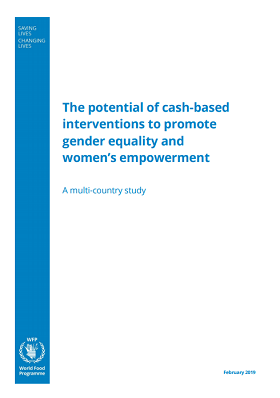
The Potential of Cash-Based Interventions to Promote Gender Equality and Women’s Empowerment
Report
The study on The Potential of Cash-Based Interventions to Promote Gender Equality and Women’s Empowerment sought to explore how CBIs can contribute to achieving gender equality and women’s empowerment (GEWE), as ends in themselves and for food security and nutrition outcomes. Where changes in GEWE...
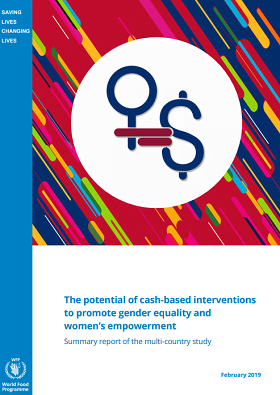
The Potential of Cash-Based Interventions to Promote Gender Equality and Women’s Empowerment – Summary Report of the Multi-Country Study
Report
The study on The Potential of Cash-Based Interventions to Promote Gender Equality and Women’s Empowerment sought to explore how CBIs can contribute to achieving gender equality and women’s empowerment (GEWE), as ends in themselves and for food security and nutrition outcomes. Where changes in GEWE...
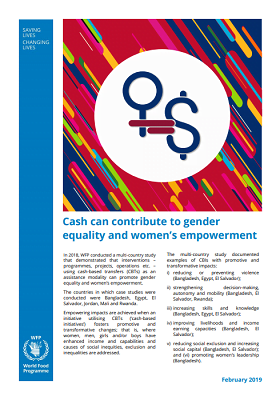
Cash Can Contribute to Gender Equality and Women’s Empowerment
Report
In 2018, WFP conducted a multi-country study that demonstrated that interventions – programmes, projects, operations etc. – using cash-based transfers (CBTs) as an assistance modality can promote gender equality and women’s empowerment. The countries in which case studies were conducted were...

Améliorer l’efficacité des transferts monétaires dans le cadre des interventions en faveur de l’éducation
Rapport
Bien que le référentiel de connaissances sur les pratiques générales relatives aux transferts monétaires se soit enrichi, d’importantes lacunes théoriques persistent concernant l’utilisation des transferts monétaires en faveur de l’éducation en situation d’urgence. En outre, ces programmes...

Networks and Collective Action : Hard-truths and top tips
Blog Post
In this guest blog, independent humanitarian consultant and former programme coordinator for the CALP Network, Isabelle Pelly, shares her advice for leveraging the power of networks for collective action.

Karen Peachey nommée Directrice du CALP Network
News
Nous avons le plaisir de vous annoncer la nomination de Karen Peachey en tant que Directrice du CALP Network. Son poste a été confirmé suite à un recrutement externe. Elle a occupé le poste de Directrice par intérim depuis le départ d’Alex Jacobs en avril 2018. Le directeur du conseil...
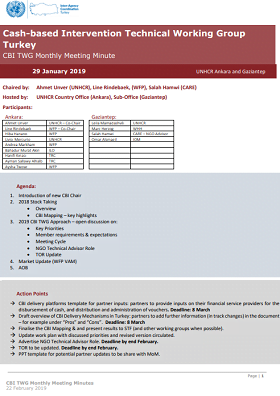
CBI TWG Meeting Minutes 29-01-19
Report
CBI TWG Meeting Minutes 29-01-19

Cash transfer Programmes – Impact on Stunting and Financial Inclusion
Report
This report focussed on evidence published in the last ten years (since 2009) on cash transfer programs’ impact on stunting and financial inclusion. The importance of maternal education on stunting emerged from the literature and warrants further investigation, which was outside the scope of this...

CVA for Protection: A Mapping of IRC’s Use of Cash and Voucher Assistance to Help Achieve Protection Outcomes
Guidelines and Tools
The IRC first began to integrate cash into protection programs in 2013, leveraging the flexibility of CVA to support clients living in urban refugee contexts in the Middle East. Since then, IRC has rapidly expanded its use of CVA to help achieve protection outcomes. This scale-up has come with important...
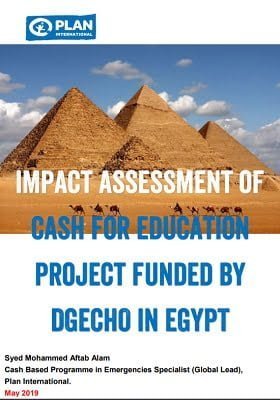
Impact Assessment for Cash for Education Project funded by DGECHO in Egypt
Report
The overall objectives of the Impact assessment were: To measure the impact of cash on the girls and boys by DGECHO funded project. To measure the impact of cash on Education and protection through a gender lens to investigate considerations of power dynamics in the households Understand the good...

Consultation on Cash and Voucher Assistance to the Main Spanish NGOs Funded by Aecid – Executive Summary
Report
This executive report summarizes the results obtained from a study of the cash and voucher assistance (CVA) practices of eight Spanish NGOs in the field of humanitarian assistance. You can read the full report in Spanish here.
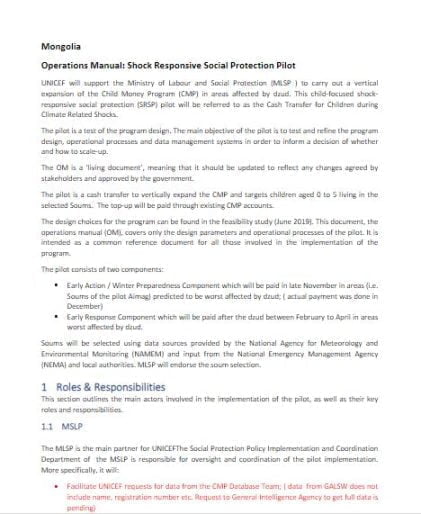
Operations Manual: Shock Responsive Social Protection Pilot
Guidelines and Tools
The pilot is a test of the program design. The main objective of the pilot is to test and refine the program design, operational processes and data management systems in order to inform a decision of whether and how to scale-up.
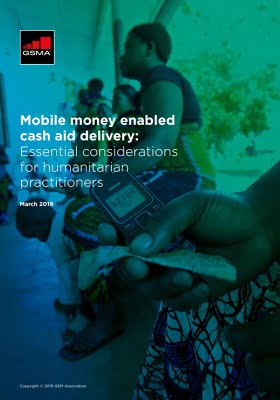
Mobile money enabled cash aid delivery: Essential considerations for humanitarian practitioners
Guidelines and Tools
This report offers guidance for humanitarian practitioners considering mobile money enabled cash and voucher assistance (CVA) programmes. It provides a foundational understanding of the design of mobile money systems for CVA, the benefits they offer relative to other common CVA delivery mechanisms, and...